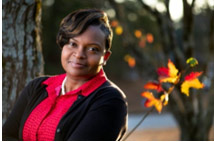By Keisha L. Jackson
Just two months ago, the U.S. celebrated Black History Month (2022 theme: Black Health and Wellness). Within the same month, the U.S. celebrated National Caregivers Day—the day Americans celebrate and honor caregivers who selflessly provide personal care, and physical and emotional support to those in need. Legendary pioneers such as Dr. Solomon Carter Fuller who endured racial discrimination, unequal salaries, and underemployment throughout his career were remembered and honored. Though Dr. Fuller faced discrimination, he made significant contributes to the study of Alzheimer’s Disease (including studying in Germany with Dr. Alois Alzheimer as well as reporting on the significance of neurofibrillary tangles five months before Dr. Alzheimer).
Although there have been gains in the number of underrepresented medical professionals, in the study of related dementias, there is STILL work to be done.
One medical professional advancing “dementia knowledge” within the black community is Dr. Fayron Epps. Dr. Epps is a principal investigator for Faith Village Research Lab and Assistant Professor of Nursing at Emory University. She works closely with an interdisciplinary team to promote quality of life for African Americans living with dementia and their family caregivers/care partners through self-care and meaningful activities.
Dr. Epps has also worked with colleagues to develop a course, “Caregiving While Black.” The goal of course is to address the cultural reality of “Caregiving While Black” during a public health crisis.
“Caregiving While Black” is hearing-impaired accessible.
The course is part of a study and an honorarium ($40 gift card) is provided for participation in each baseline and post-intervention interview and each semi-structed interview.
Eligibility requirements include:
According to the Centers for Disease Control and Prevention (CDC), there will be four times as many African Americans with Alzheimer’s and other forms of dementia by 2060 than there are now.
The more we learn now about dementia…the better we can speak up and interact with the health system with knowledge.
The more we learn now about dementia…the more contributions we can make within our homes and our community.
The more we learn now about dementia...the better we’ll be.
To learn more about “Caregiving While Black” as well as other Faith Village dementia-focused projects, contact Dr. Epps at 678-723-8188 or go to https://scholarblogs.emory.edu/epps-faithvillage/research-projects/care/
Fayron Epps, PhD, RN, FAAN
Assistant Professor of Nursing
Principal Investigator
